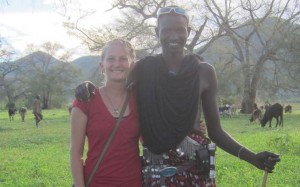I’ve essentially been stranded at our camp in Pawaga for the last week. All of the employees are on their holiday and it’s too rainy for me to safely drive our Land Rover through the muddy, unpaved roads. (Even when it’s completely dry I try to avoid driving the truck as much as possible. I still haven’t gotten the hang of driving on the left side of the road, and shifting with my left hand is still awkward.)
So I spend most of each day doing computer work that I fell behind on because of very limited electricity in the last month or two. I’ve been entering data, catching up on emails, typing up documents, organizing things, working on new lesson plans, etc. But there is only so much work I can do before I need a break. Since I can’t really leave camp and the only other person at camp right now is our guard, Isacka, my activities are limited. My favorite activity, swimming in the river, is also off limits now that the water is too high, too fast-moving and (probably) too full of crocodiles for safe swimming. So I’ve spent a lot of time playing Frisbee, playing cards and watching Planet Earth with Isacka.
Our daily ritual this week has been to watch a Planet Earth episode before cooking dinner. I started off showing him all the land based episodes, since I figured he could relate to those animals better, seeing as he’s never seen a body of water other that the rivers around his village and camp. I don’t think he has seen any aquatic life (probably not even in pictures or videos) other than fish caught in the rivers. But last night we ran out of land-based episodes so we watched Shallow Seas. He was mesmerized.
Throughout the entire episode he never stopped asking me questions. Every time a new animal came on the screen he gave a little gasp. He couldn’t believe these creatures actually existed. He wanted to know what every animal is called, where it lives, what it eats, how big it is, what it’s doing in the video, etc. Isacka doesn’t speak any English, so I answered as well as I could in my broken kiswahili. It made me so happy to see how excited he was to see these new animals and how interested he was in learning about them.
Watching the video really made me realize what knowledge I take for granted. One of the first scenes is of two humpback whales. Isacka asked if they lived in the air, like birds, or underwater. I thought to myself, look at it…it’s a whale…it can’t fly…of course it lives underwater! But looking at it from his perspective, it looked like no animal he had ever seen before and it was surrounded by a light blue background, which for all he knew could have just been a blue sky. He was especially flabbergasted when I told him the mama humpback whale is about the size of ten elephants.
While watching the episode I quickly realized that in order for him to understand anything about these new creatures I would have to explain things to him using references he was familiar with. He asked me why fish live in groups. I tried to explain that in some ways fish living in groups is similar to why impala live in groups – it’s more safe to live in a big group that to be alone. It’s also similar to why zebra have stripes and live in groups – it confuses the predator and the predator can’t distinguish between individuals. When he asked how big any animal was, numerical measurements didn’t work. Instead I compared them to other animals he knows. Like a baby humpback whale is about the size of an elephant and the mom is about the size of 10 elephants. “How big is a dugong?” A little bigger than a cow. “How big is that fish?” The same size as you. (He was really referring to a dolphin, but try as I might, I don’t think I will ever be able to convince any Tanzanian that dolphins and whales are not fish.)
It was definitely difficult to explain some things in the video. For instance, how could I explain coral? All I could explain with my Swahili was that it’s mostly like an animal, but also kind of like a plant. That just baffled his mind, and rightly so. Every time he saw a small creature he asked if it was an mdudu (bug) – starfish, urchins, jellyfish, baby squid. I really didn’t know what else I could call them, I just had to say that yup, I guess they are kind of like bugs. (I think Isacka’s definition of bug is a little broader than mine anyway. In the last two days he called both lizards and mongooses bugs.)
Later in the evening while I was cutting vegetables for a salad, I overheard Isacka talking to Juma, our 65+ year-old guard who only stays at camp at night. Isacka was telling Juma about this animal that lives underwater that is the size of 10 elephants! Juma couldn’t believe it. Isacka went on to tell him about all the other things he learned from me and Planet Earth. Then Isacka got out the world atlas that we had looked at together earlier in the day and taught Juma what I had taught him about the maps. Isacka taught Juma how the world flags on first page were in alphabetical order, that you could tell countries apart because they were different colors, that the blue parts were water, and his favorite fact – that Shakira is from Columbia.
Juma was so interested in this “fish” that was supposedly the size of 10 elephants that we watched the episode again that night with Juma. Isacka enthusiastically repeated to Juma nearly everything I’d told him when we watched it the first time. He remembered what all the animals ate, what they were doing in the video, how big they were, etc.
It made me so happy to realize that Isacka really was listening and retaining what I was telling him. I doubt there is any way I could have repeated those facts like he repeated them to Juma, even if someone told me beforehand to remember everything that was being told to me because I would have to repeat it later.
I’ve also learned a lot from Isacka these last few days. This week has really been the first time that I’ve been away from my translators. So I’ve really been forced to speak Swahili. He’s taught me a lot of new words and he has been patient when I barely understand anything he says.
-Becky Gottlieb, Field site manager



